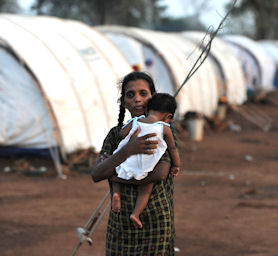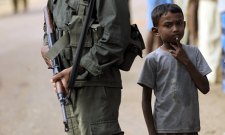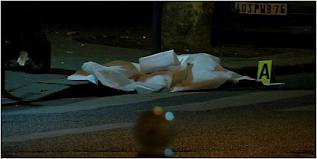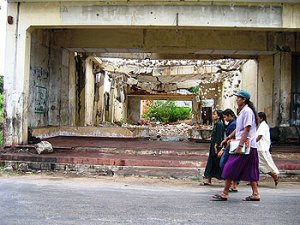 The dream of an independent Tamil Eelam has been crushed on 2009, buried with 140 000 innocent Tamils. In few months 4 years will be passed from then. The Tamil diaspora is convinced that justice will prevail, because the world cannot be so deaf and blind to such a tragedy. I’m wholeheartedly advocating this cause. I’m persuaded that this was a genocide and that the international community will be harmed by ignoring this carnage. What about the UN’s mission? What about the protection of innocents? What about the principle of human rights?
The dream of an independent Tamil Eelam has been crushed on 2009, buried with 140 000 innocent Tamils. In few months 4 years will be passed from then. The Tamil diaspora is convinced that justice will prevail, because the world cannot be so deaf and blind to such a tragedy. I’m wholeheartedly advocating this cause. I’m persuaded that this was a genocide and that the international community will be harmed by ignoring this carnage. What about the UN’s mission? What about the protection of innocents? What about the principle of human rights?
At the same time I’m fully aware that time is precious. Any year that passes, brings a veil on the events. In the hearts and minds of the Tamil will stay forever, not so for the international community. Other tragedies crowd the world stage, other victims, other innocents. The more distance Rajapaksa is able to put between him and the crimes, the easier will be to walk away. So far he’s doing well.
But I don’t give up to the historians, I still believe that the Sri Lanka’s massacres are open wounds, they are still bleeding and because of that, we can still hope in justice. When historians will study those events, even if they will recognize the magnitude of the carnage, they won’t bring justice. When scholars and academicians debate about the causes and the figures from a purely theoretical perspective, justice is dead.
 If we are not able to highlight the case until is alive, we will condemn those victims to die twice.
If we are not able to highlight the case until is alive, we will condemn those victims to die twice.
For this reason, time is running out.
This is an appeal to the Tamil community, especially the diaspora: give up your intrigues, give up your pride, give up all the obstacles that are impeding a real process of accountability.
If you think you have done everything, let me explain. You want to believe in an independent Eelam, you want to worship the heroism of the Tigers, you want accountability for the Sri Lankan government, you want to help the Tamil still suffering in the Northern and Eastern provinces. You want all of this and you are surprised that the world is not listening. This is the point. The Tamil diaspora never entered in a critical process. And they woke up with the entire international community against their side. Is everybody in the world a Tamil hater? Is everybody against the idea of an independent Tamil Eelam? Is everybody so happy to support Rajapaksa? Of course not, it is just the blindness of your convictions that push everybody against you.
 What is your priority? Revenge against Sri Lanka?Or Justice? Independent Eelam? Or helping the Tamils in Sri Lanka?
What is your priority? Revenge against Sri Lanka?Or Justice? Independent Eelam? Or helping the Tamils in Sri Lanka?
Decide. And act. Otherwise you’ll spend the next 50 years discussing, arguing and fighting within the community. Sri Lanka and Rajapaksa will find a fragmented front, with nobody able to present a decent request. Even too easy to sweep away the question from the table.
What do you want?
Do you want to consider the Tigers a heroic army, that righteousness fought with principles? OK, the Sri Lankan government fought the same battle, with the same principles. And it won. Do you want to consider that army criminal? Then you must accept that LTTE adopted criminal means.
 Are you fighting for the Tamil people or for your aspirations and ambitions? When you were living a pleasant, comfortable life, your brethren in Sri Lanka were fighting, often in the last years, against their will. Are they a bargain chip, expendable on the battle field as well as in current political debate? Or they are the last inhabitant of Eelam and deserve all the attention and the efforts that you can put together? Is it better to have the flag of Eelam or better, decent conditions for the Tamil people?
Are you fighting for the Tamil people or for your aspirations and ambitions? When you were living a pleasant, comfortable life, your brethren in Sri Lanka were fighting, often in the last years, against their will. Are they a bargain chip, expendable on the battle field as well as in current political debate? Or they are the last inhabitant of Eelam and deserve all the attention and the efforts that you can put together? Is it better to have the flag of Eelam or better, decent conditions for the Tamil people?
Decide. But do it quickly. The international community won’t wait the Tamil age of discussion. They will forget soon. And leave you with your internecine polemics. Time is running out.








